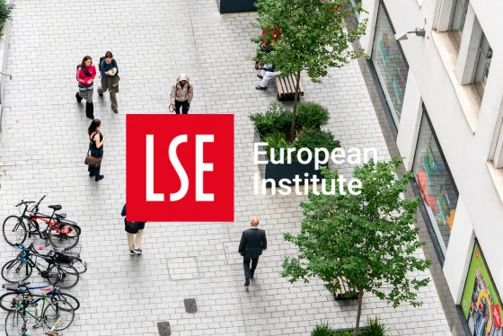Overview
Introduction
The MSc in Culture and Conflict in a Global Europe from LSE and the MA in European History, Politics, and Society from Columbia jointly offer the European Politics, Conflict and Culture programme to students.
This double degree programme delves into the origin and dynamics of modern European politics, economies, societies, and cultures, and examines their role in shaping conflicts in the global context. As an MSc student, you'll study how globalisation shapes Europe as a political and cultural space and explore its role as a global actor.
The programme offers a vast array of courses in the social sciences and humanities, hosted by the European Institutes of the LSE and Columbia University.
You'll develop your research, policy analysis, writing, and presentation skills, using methods from political science, international relations, history, sociology, philosophy and economics. You'll have access to mentorship from experienced faculty in the UK and the US.
Preliminary readings
The following reading list indicates the range of literature you will encounter on the programme. You're encouraged to read some of them before you arrive.
- B Anderson Imagined Communities: reflections on the origin & spread of nationalism (Verso, 2016)
- Z Bauman Wasted Lives: modernity & its outcasts (Wiley, 2003)
- L Colley The Gun, the Ship and the Pen: Warfare, Constitutions and the Making of the Modern World (Profile 2021)
- S Glendinning Europe: A Philosophical History, Part 1: the promise of modernity (Routledge 2021)
- A Pagden The Idea of Europe, from Antiquity to the European Union (Woodrow Wilson 2010)
- R Scruton The West and the Rest, Globalization and the Terrorist Threat (Bloomsbury, 2003)
- R Wodak Right-wing Populism in Europe (Bloomsbury, 2013)
- S L Woodward The Ideology of Failed States: why intervention fails (Cambridge University Press, 2017)
- D Kostovicova Reconciliation by Stealth: How People Talk about War Crimes (Cornell University Press, 2023)
- J White In the Long Run: The Future as a Political Idea (Profile, )
Entry requirements
Upper second-class honours (2:1) degree or equivalent, preferably in a social science subject.
Please select your country from the dropdown list below to find out the entry requirements that apply to you.
Overseas
English language requirements
The English language requirement for this programme is Higher. Read more about our English language requirements.
Competition for places at LSE is strong. So, even if you meet the minimum entry requirements, this doesn't guarantee you an offer of a place.
However, please don’t feel deterred from applying – we want to hear from all suitably qualified students. Think carefully about how you can put together the strongest possible application to help you stand out.
Programme content
Each student participating in this programme will complete two full academic years in total (one each at Columbia and LSE). The programme also includes the writing of a Dissertation or Applied Policy Project, which will be prepared and assessed at LSE in year two.
Year 1
First year at Columbia
The first year is spent at Columbia University. Students will join the MA in European History, Politics and Society, on their own track.
Year 2
Second year at LSE
The second year runs from September until September of the following year. Students will join the MSc Culture and Conflict in a Global Europe, on their own stream.
You'll also take EU4A9 European Politics, Conflict and Culture - a series of hybrid workshops and lectures joint-led by faculty at the LSE and Columbia, and EU410 Interdisciplinary Research Methods and Design - which will help prepare you for your dissertation. You'll also choose from a number of workshops as part of EU450 Engaging with Europe: Professional Skills. EU450 is a programme designed for your professional development which offers additional training sessions, and thematic workshops throughout the year.
Courses to the value of two units from a range of options
Why study with us
Discover more about our students and department.
Meet the department
The European Institute is a multidisciplinary centre for the study of European politics, economics and culture.
Founded in 1991, the institute is the UK's leading centre for the study of Europe, offering a range of master’s programmes and an extensive MPhil/PhD programme. Every year, we welcome more than 200 master’s and 30 doctoral students from all regions of the globe.
Our research spans four key themes – political economy, politics and policy, culture and society, and migration. Teaching and research draw on the expertise of staff from many different disciplines across LSE, including politics, economics and sociology.
The institute is outward facing. We run dozens of events each year, with workshops, seminars and presentations, welcoming high-profile speakers, including former presidents, prime ministers, foreign and finance ministers, distinguished scholars and influential commentators.
Internationally, we’ve forged close links with several partner institutions, including Sciences Po (Paris), Bocconi University (Milan), Fudan University (Shanghai), and Columbia University (New York) with whom we run double master’s programmes.
Why LSE
University of the Year 2025 and 1st in the UK in 2025 and 2026
Times and The Sunday Times - Good University Guide 2025 and 20261st in London for the 14th year running
The Complete University Guide - University League Tables 20266th in the world for the study of social sciences and management
QS World University Rankings by Subject 20256th in the world for leading the way in social and environmental sustainability
QS World University Rankings: Sustainability 2026Your application
Overview
If your application is successful you'll also be expected to complete a free application via the LSE system so that you can provide relevant copies of required documentation.
We welcome applications from all suitably qualified prospective students and want to recruit students with the very best academic merit, potential and motivation, irrespective of their background.
Applications are administered by a joint admissions board of representatives consisting of both LSE and Columbia University. Successful applicants will be notified by email and post
Supporting documents
In addition to the submitting the application form, you must also submit the following documents as part of the application process:
- a full and official transcript of marks obtained for each year of university level education, including the current year when available.
- a certified copy of your undergraduate degree (if applicable). Documents written in languages other than English must be accompanied by a certified translation.
- a curriculum vitae or résumé.
- a statement of academic purpose to be submitted in English. The statement of academic purpose allows the university to evaluate your ability to succeed academically and the reasons you wish to undertake the degree. It should describe briefly your academic and/or professional background (relevant coursework, professional experience, or other activity pertaining to your academic interests); indicate your plans for graduate study at Columbia; and explain clearly the relation of your studies to your plans after completing the double degree.
- a personal statement (maximum 1,000 words) that explains how your personal experiences and history will allow you to contribute to the wealth of perspectives in the entering class of the Graduate School of Arts and Sciences and in the Columbia community at large.
- three letters of academic recommendation; at least two letters must come from academic sources. If you haven't been enrolled in an academic programme in recent years, your third letter may be submitted by a professional reference. These should be in English or be accompanied by a certified translation.
- a writing sample between 10 to 15 pages long, preferably a paper that you've written for a course pertaining to the general field of modern European studies. Alternatively, you may provide a focused essay written in an academic style that examines an article, book, exhibit, or event relevant to your field of interest.
If your native language is not English or your undergraduate degree is from an institution in a country whose official language is not English, you must submit scores of the TOEFL or IELTS exams. For more information, please see the Information for International Students page on the Columbia University website. Please also see the LSE English language requirements.
Data sharing
Double degrees and certain other degrees and scholarships require that LSE shares personal data with another university or partner. In our agreements we will use the School’s standard data sharing template for universities and partners in the EU and EEA and in an adequate country. Standard contract clauses will be used for any other country. If you have any questions about this or how your personal data will be treated by LSE, please contact the Data Protection Officer via glpd.info.rights@lse.ac.uk or check our Student Privacy Notice. Columbia University has an international privacy notice available if you have any questions on how they'll treat your personal data.
When to apply
Deadlines for application are 30 January 2026 (early deadline), and 12 March 2026 (final deadline).
Applicants who wish to be considered for funding in Year 1 at Colombia are strongly encouraged to apply by the early deadline date, 30 January 2026.
Applications will be considered until 1 May 2026 on a space-available basis.
Fees and funding
The table of fees shows the latest tuition fees for all programmes.
You're charged a fee for your programme. At LSE, your tuition fee covers registration and examination fees payable to the School, lectures, classes and individual supervision, lectures given at other colleges under intercollegiate arrangements and, under current arrangements, membership of the Students' Union. It doesn't cover living costs or travel or fieldwork.
Home
Year 1 (at Columbia, 2026/27):
Home students: See Columbia fee
Year 2 (at LSE, 2027/28):
Home students: £30,400 (provisional)
Overseas
Year 1 (at Columbia, 2026/27):
Overseas students: See Columbia fee
Year 2 (at LSE, 2027/28):
Overseas students: £32,000 (provisional)
Learning and assessment
How you learn
How you're assessed
All taught courses are required to include formative coursework, which is unassessed. It's designed to help prepare you for your summative assessments, which count towards the course mark, and to the degree award. LSE uses a range of formative and summative assessments, such as essays, problem sets, case studies, reports, quizzes, exams, online assessments and many others. Summative assessment may be conducted during the course or by final examination at the end of the course. An indication of the formative coursework and summative assessment for each course can be found in the relevant course guide.
Graduate destinations
Overview
Graduates of the programme can expect to pursue successful careers in politics, journalism, diplomacy, business, academia and consultancy, in the EU institutions, national administrations and the international institutions.
Further information on graduate destinations for this programme
Median salary of our graduate taught students 15 months after graduating:
Top 5 sectors our students work in:
Career support
From CV workshops through to careers fairs, LSE offers lots of information and support to help you make that all-important step from education into work.
Many of the UK’s top employers give careers presentations at the School during the year and there are numerous workshops covering topics such as job hunting, managing interviews, writing a cover letter and using LinkedIn.
See LSE Careers for further details.

